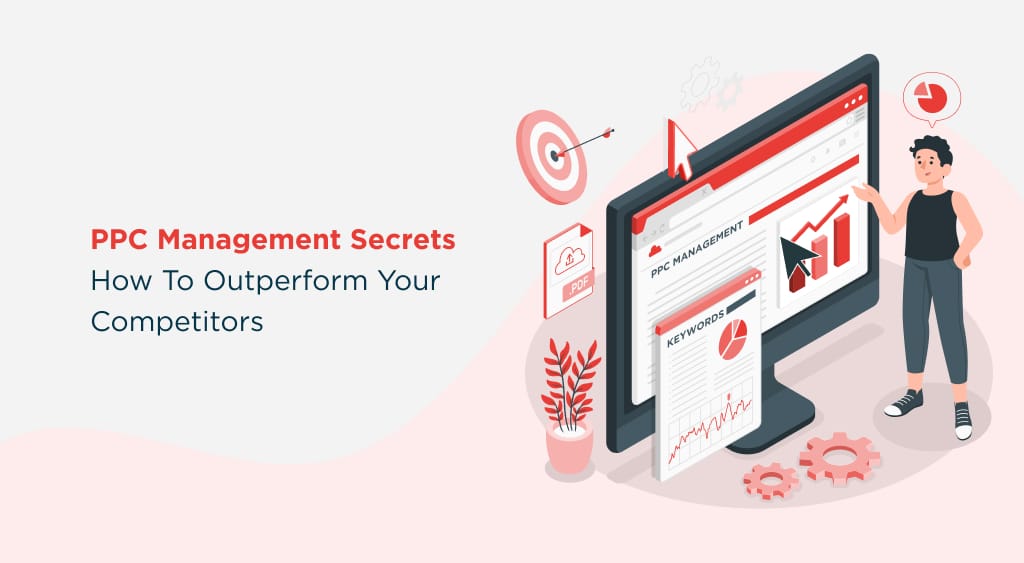PPC Management Secrets: How to Outperform Your Competitors
30 Dec 2024 | 7 min read
The Power of PPC
In the bustling digital world, Pay-Per-Click (PPC) advertising stands out as a beacon, guiding potential customers directly to your doorstep. Imagine PPC as a smart assistant, one who knows exactly who is looking for what you offer and gently nudges them your way.
But what really makes PPC so powerful? It’s all about relevance and timing. Think of it like this: You have a store selling beautiful, hand-crafted Zen lifestyle products. Someone, somewhere, is searching for exactly that. PPC is the bridge connecting their search to your store. It’s about being there at the right moment, with the right message.
The beauty of PPC lies in its flexibility. Whether you’re a small local shop or a growing online brand, PPC adapts to your needs. You control the budget, target specific audiences, and can even decide when your ads appear. It’s like having a billboard that only shows up to the people who are most likely to walk into your store, and only when they’re nearby and interested.
But here’s the catch – PPC isn’t just about setting up ads and waiting for clicks. It’s a craft. The art lies in understanding your audience, crafting messages that resonate with them, and constantly tweaking your approach based on real data. It’s a dynamic, ongoing conversation between you and your potential customers.
Why PPC Management is Important
PPC advertising holds great promise, but its success hinges on smart management. Here’s why managing your PPC campaigns well matters:
- Cost Control: Managing your PPC effectively means you’re in the driver’s seat with your budget. You decide how much to spend and when. This careful budgeting ensures you get the most out of every penny spent on ads.
- Optimal Ad Performance: Good PPC management is about fine-tuning your ads. It involves choosing the right keywords and crafting messages that speak to your audience. This increases the likelihood of clicks and, ultimately, conversions.
- Campaign Optimization: It’s not just about setting up campaigns; it’s about constantly improving them. This involves structuring your campaigns smartly, tweaking your bids, and using ad extensions for greater visibility. Regular analysis of key metrics guides these adjustments, ensuring your ads always perform their best.
- Staying Ahead: The world of PPC is always changing. Effective management keeps you up-to-date with the latest trends and tools. Adapting to new formats and technologies, like video or display ads, can set you apart and keep you ahead of the curve.
In short, effective PPC management is the key to unlocking the full potential of your advertising efforts. It’s about spending wisely, constantly refining, and staying adaptable in the ever-evolving digital landscape.
Key Components for Successful PPC Management
- Solid Campaign Strategy: The foundation of PPC success is a well-thought-out strategy. Define your goals clearly, know your target audience, and pick the platforms that align best with your objectives. It’s about charting a clear path to reach your advertising milestones.
- In-depth Keyword Selection: Keywords are the anchors of PPC. It’s crucial to select keywords that not only attract your target audience but also align with their search intent. Balance is key – targeting both popular and niche keywords effectively.
- Engaging Ad Development: The power of an ad lies in its ability to engage and persuade. Crafting ads that stand out involves creating compelling content and eye-catching designs. Continually test and refine your ads to ensure they resonate with your audience.
- Budget Allocation and Bid Management: Smart budgeting is at the core of PPC management. This means wisely allocating your funds and adjusting your bids to get the best return on investment, ensuring you don’t overspend while maximizing ad exposure.
- Ongoing Performance Review: Success in PPC requires keeping a constant eye on your campaign’s performance. Regularly review analytics to understand what’s working and what isn’t. Use these insights to fine-tune your approach.
- Adaptability to Industry Trends: The digital marketing world is ever-changing. Stay ahead by keeping up with the latest PPC trends and adapting your strategies to new technologies and changing market dynamics.
Optimizing PPC Campaigns
Optimizing your PPC campaigns is a vital step in ensuring they work effectively for you. Here’s how to do it:
- Refine Your Targeting: Start by ensuring your ads reach the right audience. This means choosing demographics, interests, and behaviors that align with your ideal customer. It’s like inviting the right people to your party – the ones who are most likely to enjoy it.
- Craft Compelling Ads: Your ads should grab attention and encourage clicks. This involves using clear, engaging language and attractive visuals. Think of your ad as a storefront window; it should be inviting and relevant to those walking by.
- Use Keywords Wisely: Keywords are the foundation of PPC. Select ones that are highly relevant to your business and what your customers are searching for. It’s not just about volume; it’s about relevance.
- Monitor and Adjust: Keep an eye on how your ads are performing. Are they getting clicks? Are they leading to sales or leads? Adjust your strategy based on this data. Think of it as steering a ship – you need to constantly adjust your course based on the wind and waves.
- Test and Learn: Experiment with different elements of your ads, like headlines or images, to see what works best. It’s a process of trial and error that helps refine your approach.
In short, optimizing PPC campaigns is about targeting the right people with the right message, using keywords effectively, and continually adjusting based on performance. It’s a dynamic process that requires attention and agility.
Tracking and Analyzing Performance
In the world of PPC, keeping an eye on how your campaigns are doing is like checking the health of your garden. You need to know what’s growing well and what needs more care. Here’s a straightforward way to track and analyze your PPC campaign performance:
- Set Clear Metrics: Decide what success looks like for your campaigns. Is it more website visits, sales, or leads? These metrics are your guideposts, helping you understand if you’re on the right path.
- Use Tracking Tools: Tools like Google Analytics are like your garden tools. They help you dig into data and understand how users interact with your ads. Are they clicking through? What do they do once they land on your site? This information is key to understanding your campaign’s effectiveness.
- Regular Reviews: Schedule regular check-ins with your campaign data. This is like watering your plants – it needs to be done consistently. Look for trends. Are certain ads or keywords performing better than others?
- Learn and Adjust: Use what you learn from the data to make changes. Maybe some ads need a refresh, or certain keywords aren’t delivering results. It’s all about tweaking and improving, like pruning a plant to help it grow better.
- Keep an Eye on ROI: Ultimately, it’s about how much value you’re getting for your spend. Are your ads cost-effective? Adjusting strategies based on ROI ensures that your campaigns are not only effective but also efficient.
In essence, tracking and analyzing your PPC campaign performance is about setting goals, using the right tools to gather insights, regularly reviewing results, learning from them, and always keeping an eye on your return on investment. It’s a cycle of continuous improvement.
Staying Ahead with PPC Trends
Keeping up with PPC trends is like staying tuned to the pulse of the digital world. It’s about knowing what’s new and how it can benefit your campaigns. Here’s a simple guide to staying ahead:
- Embrace New Technologies: PPC is always evolving with technology. From AI-driven automation to advanced targeting options, embracing these new tools can give your campaigns a competitive edge. It’s like having the latest gadgets in your toolkit.
- Watch for Platform Updates: Major platforms like Google Ads and Facebook Ads regularly update their features. Keep an eye on these changes as they can offer new ways to reach your audience or improve efficiency.
- Understand Consumer Behavior: As people’s online habits change, so should your PPC strategies. This means staying aware of how and where your audience spends their time online. Adapting your approach to these behaviors keeps your campaigns relevant.
- Learn from Industry Leaders: Follow PPC experts and industry blogs. They often share insights and tips that can inspire new strategies or improve existing ones. Think of it as having mentors guiding you through the ever-changing landscape of PPC.
- Test and Innovate: Don’t be afraid to try new things in your campaigns. Testing different approaches helps you understand what works best and keeps your strategies fresh and effective.
In conclusion, mastering PPC management is a dynamic and continuous journey. It involves crafting strategic campaigns, fine-tuning targeting, creating engaging ads, and carefully managing budgets. The key is to stay vigilant with performance tracking, making data-driven decisions to optimize your campaigns. Staying updated with the latest trends and adapting to new technologies is also crucial. Remember, the essence of successful PPC management lies in understanding and connecting with your audience effectively. By doing so, you ensure that every click has the potential to transform into a meaningful customer interaction, driving your business towards its goals.
